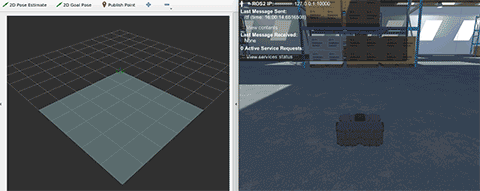ROS 2 Demo Showcases Autonomous Mobile Robot in Unity Simulation
Unity, the world’s leading platform for creating and operating real-time 3D (RT3D) content, today announced support for ROS 2 - the open-source robotics middleware suite from Open Robotics. Building on its support of ROS earlier this year, Unity is now supporting ROS 2 due to significant advancements and support of more hardware drivers, networking modules, communication architecture, and several robot algorithms. To showcase the value ROS 2 brings to robotics developers, Unity also released a demo of an Autonomous Mobile Robot (AMR) leveraging ROS 2 in Unity.
This press release features multimedia. View the full release here: https://www.businesswire.com/news/home/20210811005218/en/

RViz is a visualization tool for ROS. On the left, we show in our AMR demo how RViz is used to visualize the TurtleBot sensor data, and assign it a destination to navigate to, while the robot then takes action in Unity to accomplish the goal of getting to the destination (on right). (Graphic: Business Wire)
“ROS 2 has a lot of promising features to serve as a more emphatic tool for robotics software development than its predecessor, ROS 1,” said Dr. Danny Lange, SVP of AI and Machine Learning, Unity. “The addition of real-time support makes it suitable for time-critical and high-performance systems, including AMRs, which we demonstrate with Unity running a ROS 2 navigation stack. With this pairing of technologies, anyone can explore this scenario, regardless of their level of experience with either ROS or Unity.”
In tandem with the announcement, Unity released a new sample AMR project. The demo showcases a simple warehouse environment, a fully articulated model of a Turtlebot 3 mobile robot with simulated LIDAR and motor controllers, and a Dockerfile to make it easy to build an image containing all of the ROS 2 dependencies necessary to exercise the mapping and navigation stacks against our simulation. The demo builds off of the previously released Object Pose Estimation demonstration, which combined the power of computer vision and simulation technologies illustrating how Unity’s AI and Machine Learning capabilities are having real-world impact on the use of robotics in industrial settings.
“This demo is another powerful example of how we take a flexible framework for writing robot software, and couple it with our robotics packages so that users can more easily create intelligent robots,” added Lange. “We believe that the combination of Unity tools and others open the door for roboticists to safely, cost-effectively, and quickly prototype, develop, test, and deploy solutions.”
"We are excited by the growing ecosystem of ROS 2 compatible simulation tools,” said Katherine Scott, Developer Advocate, Open Robotics. “Simulation is a critical part of developing robust robot systems and it's important for developers to be able to choose the right simulator for their application. Unity's support for ROS 2 is a welcome addition to the growing community of roboticists who are using open source software to accelerate the development of advanced systems."
Unity’s work in the robotics field will be on display at ROSCon 2021 from October 22nd - October 23rd in New Orleans, Louisiana. To learn more about the show and how you can connect with the Unity team there, please visit Unity’s ROSCon workshop page.
To learn more about Unity’s work enabling the future of robotics, please visit our Unity Robotics page.
About Unity
Unity (NYSE: U) is the world’s leading platform for creating and operating real-time 3D (RT3D) content. Creators, ranging from game developers to artists, architects, automotive designers, filmmakers, and others, use Unity to make their imaginations come to life. Unity’s platform provides a comprehensive set of software solutions to create, run and monetize interactive, real-time 2D and 3D content for mobile phones, tablets, PCs, consoles, and augmented and virtual reality devices. The company’s 1,800+ person research and development team keeps Unity at the forefront of development by working alongside partners to ensure optimized support for the latest releases and platforms. Apps developed by Unity creators were downloaded more than five billion times per month in 2020. For more information, please visit www.unity.com.
View source version on businesswire.com: https://www.businesswire.com/news/home/20210811005218/en/
Contacts
Ryan M. Wallace
Unity Communications
ryan.wallace@unity3d.com
+1 917.442.2305






